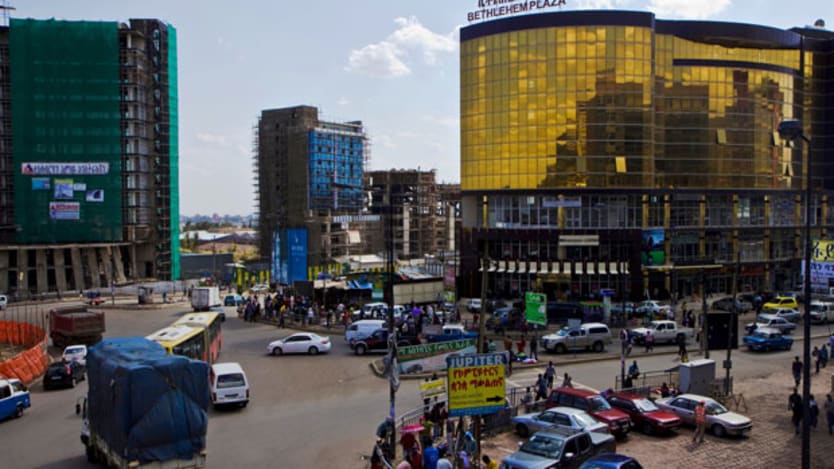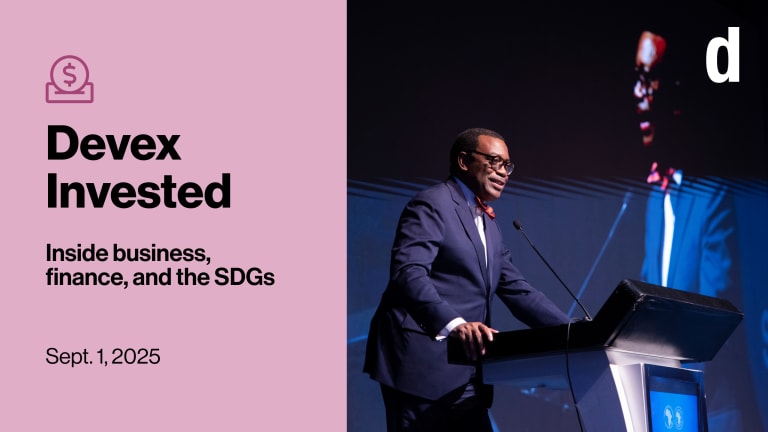
As the fate of the future Sustainable Development Goals continues to unfold, an equally important conversation is underway to determine how to finance them — in a debate scheduled for next year.
In July 2015, the international development community will gather in Addis Ababa, Ethiopia, at the International Conference on Financing for Development to do the hard work of determining how the SDGs will be financed, who will pay what and how to ensure accountability.
“The goals can only succeed if we have in place an equally ambitious plan to fund them,” said Michael Elliott, president and CEO of the ONE Campaign, adding the money is out there but “our task is to make sure the money is used in ways to help those who need it most.”
Elliott, who spoke briefly last week at the World Bank annual meetings in Washington, D.C., noted that while “extraordinary progress” has been made in the effort to end extreme poverty, the road to that goal will be more challenging and is not guaranteed.
In the lead-up to Addis Ababa, the ONE Campaign has released its 2014 DATA Report: Fighting Poverty and Financing Africa’s Future, which tracks development funding and how donors and countries are living up to their promises.
The report highlights that the right type of financing, with a high level of transparency and data that hasn’t been available to this point, is needed for the goals to work, said Eloise Todd, global policy director at ONE.
It also shows that while official development assistance rebounded in 2013, donors have yet to deliver on their funding targets. On top of that, not enough of those funds are going to the least developed countries.
While it’s true that many donors haven’t met their promised funding levels, it is also important that participants at Addis Ababa are realistic about the current economic situation, according to Akinwumi Adesina, Nigeria’s minister of agriculture and rural development.
Some countries that have traditionally contributed official development assistance, especially in Europe, he pointed out, are struggling economically and can’t necessarily be expected to meet development spending targets.
But not everyone agrees with Adesina.
“I don’t agree that economic contraction or stagnant economies is an excuse for declining ODA or to hold still,” said Barry Herman, a visiting senior fellow at the graduate program in international affairs of The New School in New York and a member of the advisory board of Social Justice in Global Development. “Some things should be protected.”
More to the least developed
There seems to be more consensus, however, that ODA funds are particularly important for LDCs, where per capita government spending is particularly low and there are fewer domestic resources.
Right now, Ireland is the only country that gives more than 50 percent of its aid to these nations, Todd said.
The U.S. Agency for International Development believes ODA has an “extremely important role” especially with the poorest countries, those least able to access financing and self-finance, explained Tony Pipa, international policy adviser and deputy assistant to the administrator with the agency’s Bureau of Policy, Planning and Learning.
USAID, he explained, has focused on conflict-affected and fragile states and is working to help countries transition to being self-supporting.
While LDCs must be supported, it’s also important to think through how to help other countries take charge of their own development, especially as they move to higher income levels, through mobilizing local resources but also ensuring that countries are fighting corruption, instituting good budgetary processes and addressing any harmful subsidies, commented Mansur Muhtar, co-chair of the Intergovernmental Committee of Experts on Sustainable Development Financing and World Bank executive director for Nigeria, Angola and South Africa.
The World Bank, he said, has been thinking through its role and what help it can provide to support institutions and policy reforms, and to stimulate private sector growth through risk mitigation or guarantees.
Governments must step up efforts to meet spending targets
Governments in sub-Saharan Africa are largely falling short on their commitments to meet budget goals for health systems and agriculture, according to the ONE report.
Key findings from ONE’s 2014 DATA Report:
1. Aid is not the only flow for financing but that it is particularly important for the least developed countries and that is where donors should focus their efforts.
2. Governments in sub-Saharan Africa also need to do better on meeting their budget commitments and the development community can help keep governments on track.
3. Data and transparency is essential to ensuring that the funds are allocated appropriately and their effectiveness is tracked.
Only six African countries met the health system spending target of 15 percent, and even when they did, as in the case of Liberia, it was such a low total amount that it still did not allow the country to build adequate health systems — and the consequences are being felt now with the Ebola epidemic.
On agriculture, only eight countries have met the 10 percent spending target, but the commitment was reaffirmed a few months ago and the trends point in an upward direction, Todd said.
Engaging governments is a critical part of the process, shared Geir Pedersen, Norway’s permanent representative to the United Nations and a co-facilitator for the Addis Ababa conference.
“ODA will be helpful only if there are real changes, if there is really ownership,” he said.
For instance, Nigeria has yet to meet its spending targets on agriculture and health, but according to the country’s agriculture minister, sometimes it’s more important to focus on efficiency and effectiveness than numerical goals.
While Nigeria spends 5 percent on agriculture, it has been able to curb corruption and modernize the farming system, Adesina said, adding these were more important than hitting the target but then losing most of the funds to corruption.
Beyond ODA
The Addis Ababa conference will have a greater focus on all financial flows, as well as how in addition to ODA, foreign direct investment, trade and remittances can be effectively used to achieve development outcomes.
“Africa in particular needs to do more in mobilizing its own domestic resources,” Adesina said.
So what is necessary to mobilize those resources? Increased capacity building, tax reforms and more successful use of natural resources fortunes, which can all be aided by development assistance, Pedersen said.
Partnerships will become a crucial part of the financing equation, as increased cooperation between governments, private companies, funds, traditional development partners and civil society can better use the strengths of each party to finance development more effectively.
The U.S. government is working to use a new model of financing development that emphasize partnership and uses ODA alongside other financial flows, Pipa said, pointing to the Power Africa initiative as an example.
The amount of private money in Africa — of which there is plenty in the form of pension funds, sovereign wealth funds, diaspora savings — can and should also be leveraged for development, Adesina said.
“We need a better mix of private investment and ODA to unlock growth for the continent,” he added.
The Nigerian minister also stressed the importance of trade to help fund development, which means expanded participation in global value chains that require infrastructure, energy, roads, ICT and boosting regional markets. This way, foreign aid can help countries develop the infrastructure to be more competitive in global markets so that they can have more resources to tackle development challenges.
Hopes for Addis Ababa
Even as expectations mount heading to July 2015, there are few delusions that the process will be without its challenges in hammering out the details and ensuring accountability.
While it’s good news that ODA rose slightly in 2013, past international conferences — such as the World Trade Organization’s ministerial meeting in Bali — have resulted in agreements that have come unwound, Herman said. Addis Ababa must be realistic and go beyond a well-drafted agreement and outline real commitments that all partners will be held accountable for.
In Ethiopia, Pipa said he would like to see a constructive conversation on how to unleash and leverage resources for development and how to create effective partnerships — with the private sector and other actors — to accomplish that goal.
More transparency globally is not enough, he insisted. We must have data at country level so that countries can think more strategically and get to a point of sustainability where they fund their own development priorities.
Adesina took it a step further. In order to get countries to act, there must be pressure to “increase the political cost of inaction,” Adesina said. “If they are not ashamed about something they are not going to change it.”
The Nigerian minister proposed creating country poverty accountability indices, which would track poverty over a politician’s term and then rank public officers on their effectiveness in reducing poverty. That data would be made available to voters.
“We need to begin to open data to empower people to make good choices,” he said.
Pedersen emphasized the importance of everyone at the table, including civil society, which at this year’s Global Partnership for Effective Development Cooperation’s first high-level meeting in Mexico City staged a protest asking for a greater role.
“We need civil society,” he said. “Without civil society watching, putting pressure on donors and countries, we will not be able to succeed.”
To Pederson, success will be mobilizing resources for common goals, but what it takes to get there remains to be seen.
Join Devex, the largest online community for international development, to network with peers, discover talent and forge new partnerships — it’s free. Then sign up for the Devex Impact newsletter to receive cutting-edge news and analysis every month on the intersection of business and development.








